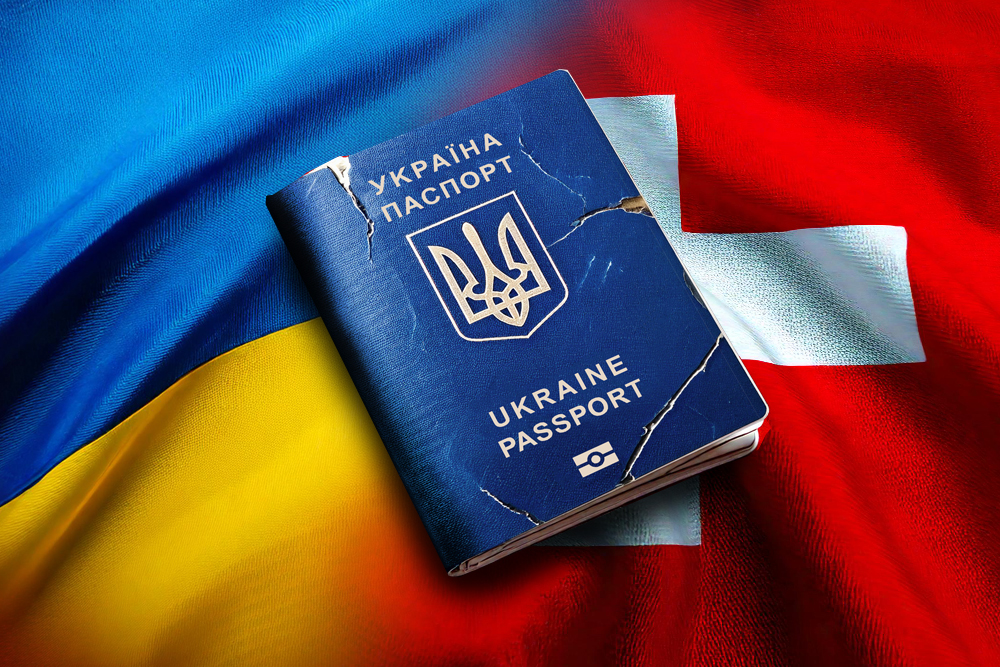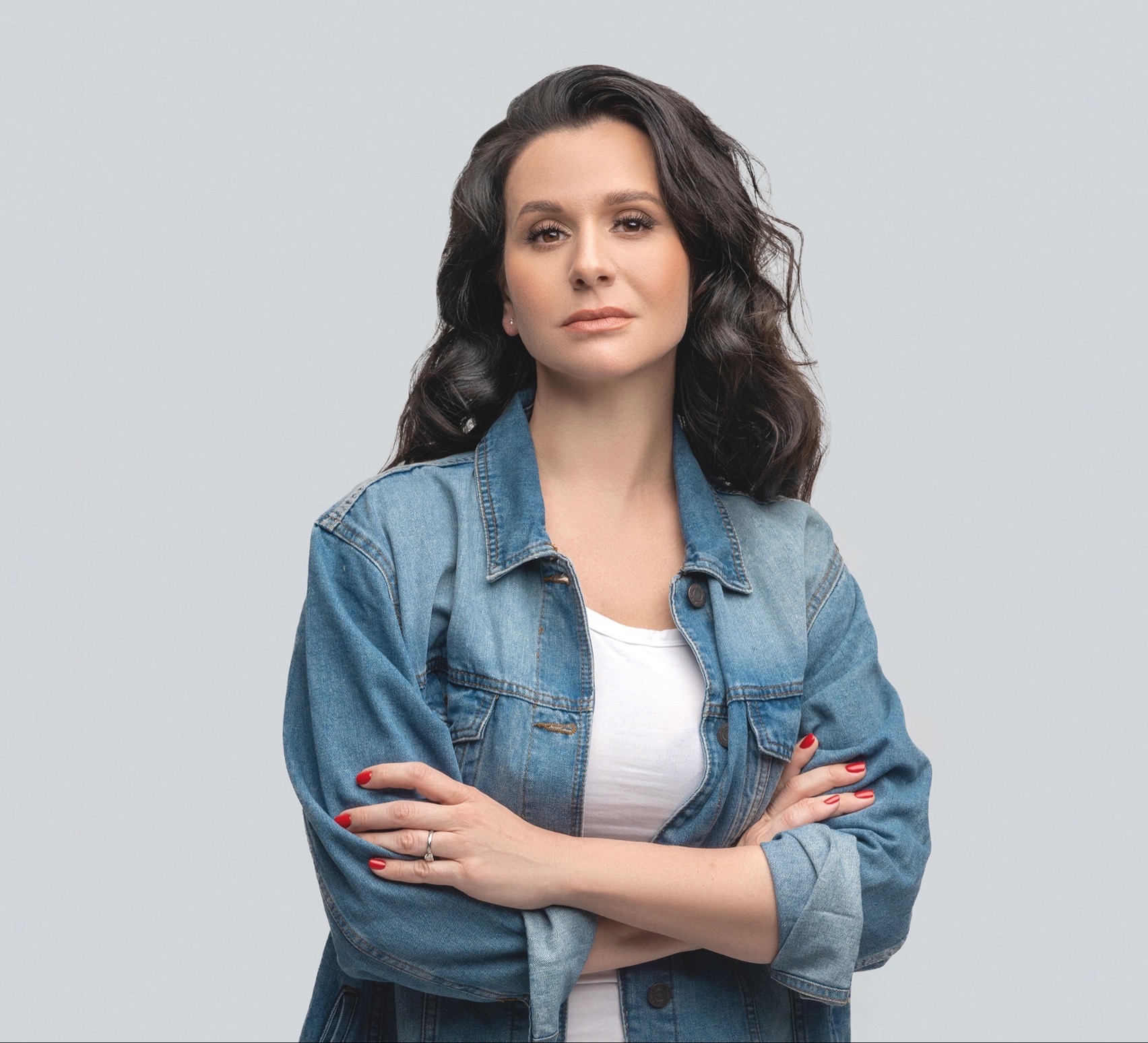
Go to war or stay put? Ukrainian men in Switzerland face fresh dilemmas

Six months ago, Ukraine passed a new mobilisation law. How has it affected the lives of Ukrainian men in Switzerland? First-hand accounts detail the personal and political consequences, as well as their inner conflicts.
The Ukrainian government sees them as draft dodgers but they view themselves as caught between their duty to their homeland and the right to live a safe life. Should Ukrainians living abroad return to fight on the frontlines? For 36-year-old Maksym* and 50-year-old Dmytro*, as well as thousands of other Ukrainian men, these questions have become increasingly difficult to ignore since May 2024, when Ukrainian authorities ramped up pressure on citizens living abroad.
+ Should Switzerland refuse protection to Ukrainian men of fighting age?
With a shortage of soldiers and rising cases of desertion, Kyiv must continually replenish the ranks of the Ukrainian army. This now includes recalling Ukrainians who had left the country, urging them to return and join the armed forces.
The new mobilisation law applies not only to those who received protection and special “S” status from Swiss authorities following Russia’s full-scale invasion of Ukraine in 2022, but also to those who had left Ukraine even before the annexation of Crimea in 2014.
All are equal before the law
Regardless of how long they lived in Switzerland or whether they have obtained Swiss citizenship, under the mobilisation law, every Ukrainian male between the ages of 18 and 60 must register for military service, undergo a medical examination, and update his residency status.
Tension, heated debates among fellow citizens, discomfort, and a growing sense of insecurity were often cited by the men SWI swissinfo.ch spoke to when they described their situation in Switzerland. Maksym and Dmytro know that complying with the new law means that eventually, everyone will be drafted into the war.
“They didn’t create any real values, but they did create corruption, poverty, and a system dominated by oligarchs”
“In the past, a medical examination would classify you as fit, unfit, or partially fit for service. Now, they’ve removed the ‘partially fit’ category. Those who were previously classified as partially fit are being reexamined,” Maksym explains, highlighting changes in the law. Before the war, Maksym worked in an office in Kyiv, and his position required frequent business trips across Europe.
Two weeks before the full-scale invasion, he happened to be in Geneva for work, and due to the closed airspace, he couldn’t return home. Later, when it became clear that “Kyiv wouldn’t fall in three days and that this was a real, long-term war” he arranged for his wife and daughter to join him in Geneva.
“I had a bad feeling before leaving Kyiv,” he says. “I left my wife cash and filled the car with fuel, put all our documents in one suitcase. And as our plane was taking off from Boryspil, I noticed a massive American military plane on the runway and thought something’s definitely wrong.”
‘Draft dodgers’ or in exile?
Men subject to the new law must update their contact information within 60 days. For those abroad, this can be done via the “Reserve+” app.External link
“If you don’t comply, you’ll first be fined 17,000 hryvnias (around $400),” Maksym explains. “The authorities will then begin looking for your personal data and can issue a draft summons to your last registered address, which is considered served regardless of whether you’re aware of it—or whether you’re living abroad or still in Ukraine”.
Those failing to answer the summons will be fined again but 25,000 hryvnias this time. Then the fines keep coming, and eventually, it leads to criminal liability. At the same time, enforcement services will look for assets to seize, says Maksym. For instance, you won’t be able to sell, transfer, inherit or conduct any transactions involving property.
“I think people aren’t as afraid of the fines as they are of the criminal charges that come once the draft summons is considered served,” Maksym says. “When you’re abroad, you have two choices: either do nothing and see what happens or comply if you think you might return one day.”
According to him, three of his acquaintances have already been denied consular services in Switzerland. It’s impossible to renew a Ukrainian passport without updating your military registration. The Ukrainian Ministry of Foreign Affairs has made it clearExternal link that Ukrainians abroad aged 18 to 60 must present a military registration document, either in paper or digital form, when applying for consular services.
“Our government is doing everything it can to make life abroad as uncomfortable as possible for Ukrainian men who haven’t registered for military service,” Maksym says. He explains that once his passport expires, he will not be able to travel outside Switzerland. Many Ukrainians that he knows are now considering getting a Romanian passport. For a sum of €3,000 and a wait of three to six months, it’s possible to become a citizen of this European Union country.
However, in Ukraine, checkpoints still check names in the database and hand out draft summons. Ukraine doesn’t recognise other citizenships acquired through naturalisation.
In April 2024, Ukraine’s foreign minister, Dmytro Kuleba, told The GuardianExternal link that only a few men living abroad were expected to return, but he emphasised the symbolic significance, saying, “guys in the trenches are very tired” while their peers across Europe are “sitting in restaurants.”
Buying body armour with their own money
After three years of war, the initial wave of patriotism in Ukraine has faded.
“People are beginning to wake up. While I’ve been here, I’ve been raising money to buy basics like rifle magazines and body armour for my friends through military supply stores. Volunteers deliver it to them because they don’t even have the essentials,” Maksym says in frustration.
“One of my friends, an airborne soldier, transferred to another brigade, where he was made a sniper,” Maksym adds. “He’s always on the front line, and they didn’t give him a sniper rifle.”
Maksym said he and others were planning to pool money to buy a rifle for their friend, but the friend managed to assemble one for himself from rifle parts. While a real sniper rifle has a range of 800 to 900 metres, the one he put together can only hit a piece of paper from 100 metres away.
“That’s not a sniper rifle, you understand?” Maksym says in frustration. He believes that not all military units receive the same level of equipment. It’s difficult for him to criticise Ukraine’s Ministry of Defence and the government during wartime, but it’s even harder to hold back his feelings.
“I think they [Ukrainian Armed Forces] have money, but how much of it actually reaches the soldiers is a big question,” Maksym says. “Nobody is expecting top-tier gear or ultra-modern weapons anymore. But people should at least have the basics, right?External link”.
Maksym says soldiers are crowdfunding for drones, electronic warfare systems and vehicles, which leaves him wondering where the funds for defence is going.
“The whole system is corrupt from top to bottom, I think.External link That’s why people are deserting and losing motivation to go to the frontline. My friend who’s there keeps telling me: ‘Don’t even think about coming here!’”.
A moral dilemma
Whether to stay in the shadow of the war with their family or step into the light to defend their country, it is a difficult choice.
“We left Ukraine in 2009,” says 50-year-old Dmytro who works and pays taxes in Switzerland. “Our son is about to get his passport here, and we’re close to applying for citizenship ourselves. Mentally, we’ve already let go of our Ukrainian citizenship, but we still have it. Our life is here, and we no longer feel Ukrainian.” He believes that until Ukraine exhausts its internal reserves, there’s no point in “chasing down people who left, especially those who left before 2014.”
“I feel anxious, of course, uncomfortable. I still have a Ukrainian passport, so I’m not totally free from all this. And there’s a sense of helplessness because you can’t explain anything to anyone,” Dmytro says.
“The worst thing in war is demotivated soldiers. Ukraine is holding on because it’s being defended by people who are deeply motivated. That’s why they’ve managed to withstand the assault. But forcing unmotivated people into the fight? That’s a ticking time bomb because you can’t turn them into good soldiers, and it’s only going to get worse.”
‘Israelis return, Ukrainians stay away’
Dmytro’s grievances with the government mirror Maksym’s. He recalls the recent anniversary of the October 7 terrorist attacks on Israelis by Hamas militants.
“I remember how the very next day, young Israelis from all over the world were scrambling to get on flights, sleeping on the airport floor just to return to Israel,” Dmytro says. “They left their universities, their comfortable lives in the West, good jobs — they volunteered immediately. In Ukraine, it’s the complete opposite.”
He believes that’s the core of the problem: people in Ukraine have nothing to defend because the Ukrainian authorities, over the years, failed to build a country that people would rush to protect.
“They didn’t createExternal link any real values, but they did create corruptionExternal link, poverty, and a system dominated by oligarchs,” he laments.
*The names of the individuals have been changed and are known to the editorial team. The views expressed by the individuals are their own and do not necessarily reflect the views of the editorial team.
Edited by Veronica De Vore/ac

More
Our weekly newsletter on geopolitics

In compliance with the JTI standards
More: SWI swissinfo.ch certified by the Journalism Trust Initiative


























You can find an overview of ongoing debates with our journalists here . Please join us!
If you want to start a conversation about a topic raised in this article or want to report factual errors, email us at english@swissinfo.ch.